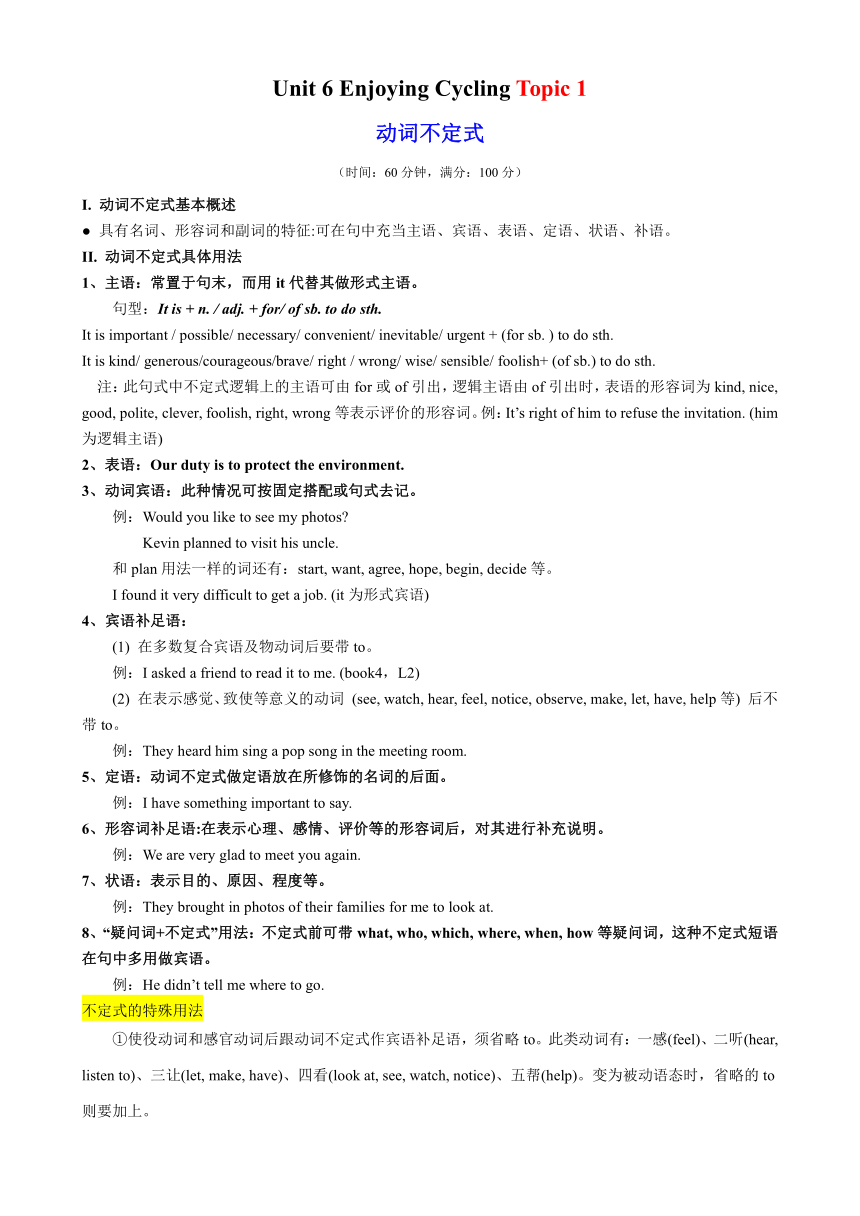
Unit 6 Enjoying Cycling Topic 1 动词不定式 (时间:60分钟,满分:100分) I. 动词不定式基本概述 ● 具有名词、形容词和副词的特征:可在句中充当主语、宾语、表语、定语、状语、补语。 II. 动词不定式具体用法 1、主语:常置于句末,而用it代替其做形式主语。 句型:It is + n. / adj. + for/ of sb. to do sth. It is important / possible/ necessary/ convenient/ inevitable/ urgent + (for sb. ) to do sth. It is kind/ generous/courageous/brave/ right / wrong/ wise/ sensible/ foolish+ (of sb.) to do sth. 注:此句式中不定式逻辑上的主语可由for或of引出,逻辑主语由of引出时,表语的形容词为kind, nice, good, polite, clever, foolish, right, wrong等表示评价的形容词。例:It’s right of him to refuse the invitation. (him为逻辑主语) 2、表语:Our duty is to protect the environment. 3、动词宾语:此种情况可按固定搭配或句式去记。 例:Would you like to see my photos Kevin planned to visit his uncle. 和plan用法一样的词还有:start, want, agree, hope, begin, decide等。 I found it very difficult to get a job. (it为形式宾语) 4、宾语补足语: (1) 在多数复合宾语及物动词后要带to。 例:I asked a friend to read it to me. (book4,L2) (2) 在表示感觉、致使等意义的动词 (see, watch, hear, feel, notice, observe, make, let, have, help等) 后不带to。 例:They heard him sing a pop song in the meeting room. 5、定语:动词不定式做定语放在所修饰的名词的后面。 例:I have something important to say. 6、形容词补足语:在表示心理、感情、评价等的形容词后,对其进行补充说明。 例:We are very glad to meet you again. 7、状语:表示目的、原因、程度等。 例:They brought in photos of their families for me to look at. 8、“疑问词+不定式”用法:不定式前可带what, who, which, where, when, how等疑问词,这种不定式短语在句中多用做宾语。 例:He didn’t tell me where to go. 不定式的特殊用法 ①使役动词和感官动词后跟动词不定式作宾语补足语,须省略to。此类动词有:一感(feel)、二听(hear, listen to)、三让(let, make, have)、四看(look at, see, watch, notice)、五帮(help)。变为被动语态时,省略的to则要加上。 ②动词不定式的否定形式是not to do,其被动形式为to be done。 Our teacher asked us not to swim in the river alone. 我们老师要求我们不要独自一人在河里游泳。 ③常接"疑问词+带to的不定式"的动词有teach, show, tell, learn, find out, decide, know, forget等。 My mother taught me how to cook yesterday. 昨天我妈妈教我如何做饭。 单项选择(本大题共50小题,每小题2分,共100分) 1.— Tom is very funny and he always makes us _____. — Yes, so he is. A.laugh B.to laugh C.laughing 2.—John looks unhappy. What happened —His mother didn’t let him _____ TV. A.watch B.watching C.to watch 3.Don’t forget _____ goodbye to your parents before you leave. A.saying B.say C.to say D.said 4.Parents always expect their children _____ good grades at school. A.get B.getting C.to get D.gets 5.Junk food is bad for my health. I decided _____ it from now on. A.to eat B.not eating C.not to eat D.to not eat 6.The boy plans _____ soccer after school this Friday. A.play B.to play C.playing 7.I wan ... ...
~~ 您好,已阅读到文档的结尾了 ~~

